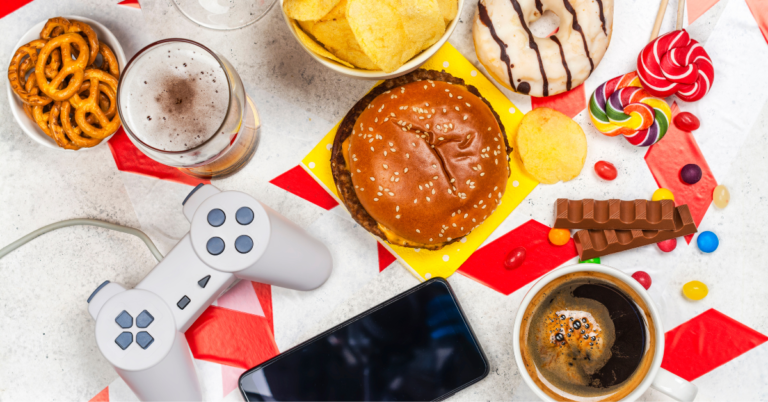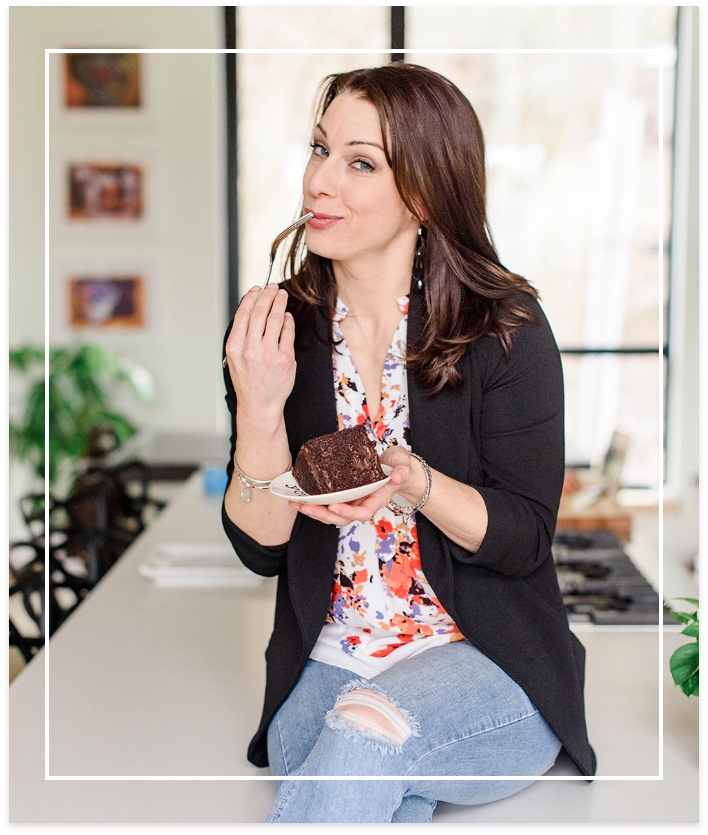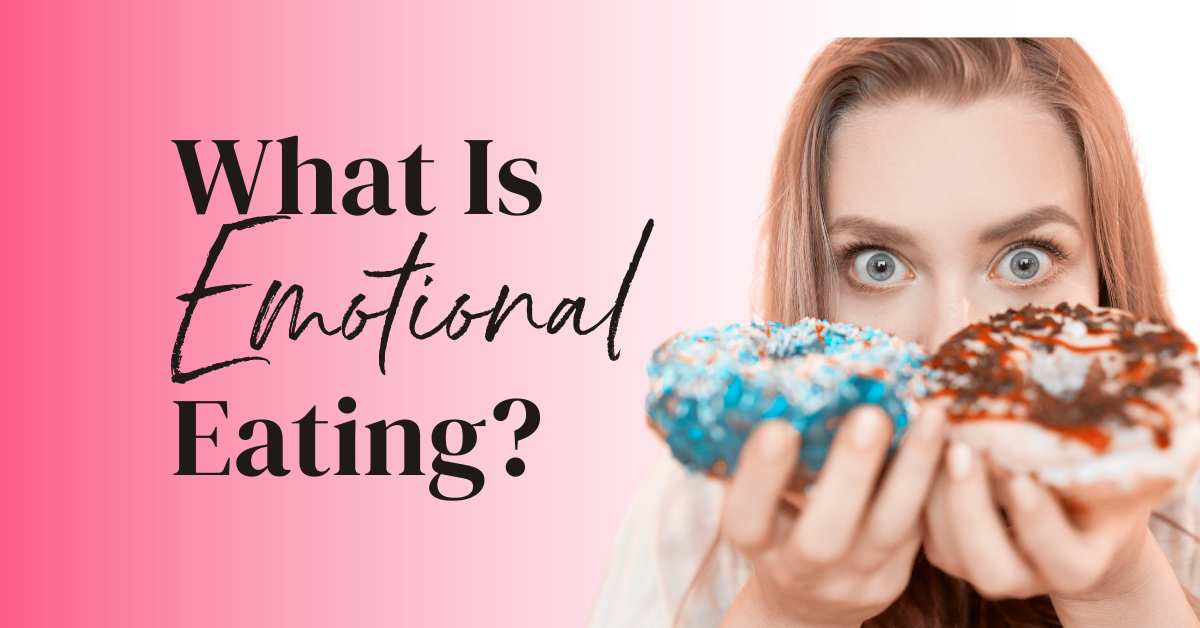Before we can talk about emotional eating, we’ve got to talk about that E word first, E-M-O-T-I-O-N-S. Instead of using the Webster definition of emotional eating, I’m going to use author Heidi Kopacek’s definition because I feel it’s pretty on point.
What Is An Emotion?
An emotion is an experience, thought, or belief expressed in the body. – Heidi Kopacek.
Think about that for a moment. An emotion is an experience, thought or belief expressed in the body. How do you know when you’re having an emotion? You feel it. What do you feel your emotion with? Your body.
Logic and intellect are important for navigating the outer world but they are useless for aiding our inner one. And oftentimes, it’s our inner world that tends to get the short end of the stick when it comes to listening, understanding, and responding to.
Logic and intellect don’t do anything, for example, to establish connections with others, help with matters of the heart, soul, or cultivating vitality.
Emotions ARE a form of logic but that of our inner experience.
They have information to relay to you and therefore if you struggle with emotional eating, it’s important to understand what they are trying to say and how to best engage with them (and NOT ignore them!).
Evolution of Emotional Eating
What’s interesting is, the ability to feel emotion evolved millions of years before our ability to think! Our feelings are more of a basic part of who we are than our thoughts, yet if we are not taught how to read into this primitive, evolutionary aspect of ourselves, or taught to ignore it all together, we’re going to have some problems!
In today’s world, the symptoms of weight, overeating, and binge eating can be common signs of feeling challenged tuning into our emotional, inner world. As with any symptoms, you don’t want to treat the symptom, you want to get to the root issue of why that symptom is even here, and in the case of emotional overeating, it involves learning more about your emotions and learning new healthy strategies to cope.
I cannot express the importance enough that having an emotional connection with food is VERY important when it comes to a healthy relationship with food. We learn as early as infancy that emotions are tied to food. Think about it…when a baby cries, what do we do? We soothe it with a bottle or mother’s milk.
Food is part of every culture around the world. I know I feel “home” when I smell cinnamon or vanilla; I feel a sense of safety with a chicken pot pie, or a feeling of belonging and family when my sisters have a baking competition to determine who makes the best thumbprint cookies at Christmas.
It’s ok to enjoy food, love food, think about family and food together in the same sentence. Food can and should bring us pleasure and comfort…generally speaking, but…

What Is Emotional Eating?
Too many of us, unfortunately, use food as a placeholder for our emotional needs, or use food to outright distract or numb ourselves from feeling our own emotions.
We live in a culture in which food has become inextricably bound up with emotion and circumstances and we find ourselves eating out of boredom, anger, happiness, loneliness, anxiety, sadness, excitement, you name it…
That’s ultimately what emotional eating is, when we eat upon being triggered by such emotions versus eating because of biological hunger cues. And although we may get short term comfort from food, without proper care taking skills, we get stuck, and we become dependent on food for that instant feel-better fix. But, as you’ve learned, food doesn’t fix feelings and diets don’t give you the skills to learn how to tap into your emotional needs.
This is another reason why diets only serve as a band-aid. At some point you’ve got to dig your heels in, and do the inner work.
The Psychology of Emotional Eating
When we experience emotion, specifically negative emotions, such as stress, anxiety, depression, or loneliness, our brains release chemicals that make us feel good, such as dopamine and serotonin. Food can also trigger the release of these chemicals, which is why we often crave comfort foods when we’re feeling down.
This doesn’t mean you are addicted to food, there are other activities that also produce a dopamine response. But manufactured food is just that, manufactured to give you the biggest hit of dopamine, so when the tough times come and you need dopamine, the brain will almost always yearn for that piece of chocolate cake over fun, snappy music that may not give you as much of a dopamine return.
Emotional eating can then become a habit, as we neurologically over time associate certain emotions with certain foods. We find ourselves doing without even realizing it until that bag is empty and every crumb accounted for. For example, we may turn to ice cream when we’re feeling sad or chocolate when we’re stressed. Over time, this can lead to chronic overeating, weight gain, and unfulfilled needs. So it’s not a lack of will power thing, it’s simply your biology, kicking in to look out for you on your behalf.
Now that we can get some of the judgment out of the way, you can make room to look at your emotional eating and find solutions that are actually beneficial for you, not to just get you through the heat of the moment, but to truly nurture your body, mind, and spirit.

How to Improve Your Emotional Eating
Controlling emotional eating can be challenging, but it’s not impossible. Here are some tips to help you get started:
#1 Identify Your Triggers
Pay attention to what triggers your emotional eating. Is it stress at work? Relationship problems? What is this emotion asking of me? Do I need to listen to it or am I simply being triggered due to something in my past? Merely pausing and tuning in will help decommission the intensity of that negative emotion rather than ignoring it and letting it build. Oftentimes we have the answers within us, we just need to listen.
Once you identify your triggers, you can work on finding healthier ways to cope with these emotions.
#2 Find Healthy Alternatives
Instead of turning to food to cope with negative emotions, find healthier alternatives. How could you meet your true needs in healthier ways? For example, you could try going for a walk, find more fulfilling ways to connect with other humans, go somewhere new, tap into an old hobby, take more breaks throughout the day for yourself. Check out this 175 Things To Do Besides Emotionally Eat download for some healthy ideas.
Every time you do NOT turn to food to cope, you weaken that neuro association that food fixes your feelings just a little bit more. It’s a de-conditioning process that times some patience, and know you won’t always win every time, especially at first. The pull to eat can feel intense at times, but keep practicing and eventually you’ll create new healthier coping skills.
#3 Practice Mindful Eating
When you do eat, practice mindful eating. Pay attention to the taste, texture, and smell of your food. This can help you enjoy your food more and prevent overeating. Plus, you get some practice to “just be”. Be here, not in the past, not in the future, not in the fight or flight that you may be chronically living in without realizing it. Mindful eating in itself is usually a re-learning experience, so again, be patient with yourself. For more support, check out this free mindful eating training to help you get started.
#4 Seek Support
If emotional eating is a persistent problem, we’re here to serve as your means of support. Nobody can get through life without some sort of help, and when it comes to healing tough eating issues, it’s almost impossible to figure it all out on your own. Let us help you work through your emotions and develop healthier coping mechanisms. A great place I always recommend you start is our Diet Freedom Membership!

Author Shelby McDaniel
Hi! I’m Shelby and I’m a food lovin’ nutritionist but…I’m not a regular nutritionist. I’m an intuitive eating specialist, eating psychology practitioner, and Certified Mind Body Nutrition Coach, here to free you from diet culture once and for all! Because you deserve peace with food, eating, and your body. (Yes, I'm talking to YOU!)



